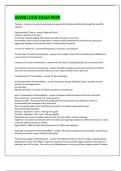ASWB LCSW EXAM PREP
Theories - answer-Are general explanations supported by evidence obtained through the scientific
method.
Psychoanalytic Theory - answer-Sigmund Freud
Client is a product of his past
Treatment involves dealing with repressed material in the unconscious
Personalities arise because of attempts to resolve conflicts between the unconscious sexual and
aggressive impulses and social demands to restrain these impulses
3 Levels of Awareness - answer-Preconscious, Conscious, Unconscious
Preconscious (3 Levels of Awareness) - answer-Info outside of the client's attention but available and
easy to bring to consciousness.
Conscious (3 Levels of Awareness) - answer-Info the client is paying attention to at any given time.
Unconscious (3 Levels of Awareness) - answer-Thoughts, feelings, desires and memories of which a
client has no awareness but that influences every aspect of their day-to-day lives.
3 Components of Personalities - answer-Id, Ego, Superego
Id (3 Components of Personalities) - answer-Instinctual energy, biological urges, impulses toward
survival, sex and aggression.
Unconscious.
Pleasure principle - the drive to achieve pleasure and avoid pain.
Ego (3 Components of Personalities) - answer-Manages conflict between Id and the real world.
Has unconscious, preconscious or conscious parts.
Reality principle - the awareness that gratification of impulses has to be delayed in order to
accommodate the demands of the real world.
Role is to prevent the Id from gratifying its impulses in socially inappropriate ways.
Ego-Syntonic/Ego-Dystonic:
Syntonic - behaviors "insync" with ego (no guilt)
Dystonic - behaviors "dis n sync" with ego (guilty)
Determine best course of action based on info from id, reality, and the superego.
Inability to reconcile the demands of the Id, reality and superego produces conflict that leads to a state
of psychic distress known as anxiety.
Ego strength - ability to deal with demands of id, reality and superego.
Superego (3 Components of Personalities) - answer-The moral component of personality, learned from
parents and society, causes clients to feel guilty.
Psychosexual Stages of Development - answer-Freud believed there to be five stages of psychosexual
development: Oral, Anal, Phallic, Latent and Genital. At each of these stages, pleasure is focused on a
particular part of the body. Too much or too little pleasure in any one of these stages caused a fixation
, which would lead to personality or psychological disorders. For example, too much pleasure in the
phallic stage could lead to obsessive masturbation and sexual dysfunction as an adult.
Oral (Stage of Development) - answer-Birth-12 months
Pleasure centers on mouth; sucking, biting, chewing.
If not satisfied result is excessive smoking, overeating, or dependence on others.
Anal (Stage of Development) - answer-Age 2 (during toilet training)
Pleasure centers on Bowel movements.
If not satisfied result is an overly controlling (anal-retentive) personality or an easily angered (anal-
expulsive) personality.
Phallic (Stage of Development) - answer-Age 3 to 5
Pleasure centers on Genitals.
If not satisfied result is Guilt or anxiety about sex.
Latency (Stage of Development) - answer-Age 5 to Puberty
Pleasure centers on Sexuality is latent, or dormant, during this period.
No fixations at this stage.
Genital (Stage of Development) - answer-Begins at puberty
Pleasure centers on The genitals; sexual urges return.
No fixations at this stage.
Fixation - answer-Is an inability to progress normally from one stage into another.
Oedipus complex - answer-A male child's sexual desire for his mother and hostility toward his father.
Castration anxiety - answer-Fear of penis being cut off, child accepts father and authority results in
superego.
Primary techniques used in psychoanalytic psychotherapy - answer-analysis of dreams, resistances,
transferences, and free associations
Individual Psychology - answer-Alfred Adler's view that people are motivated by purposes and goals and
that perfection, not pleasure, is thus the key motivator in human life.
Compensation - answer-Attempt to shed normal feelings of inferiority.
Inferiority - answer-Overcompensate, try to cover up their sense of inferiority by focusing on outward
signs of superiority such as status, wealth and power.
Aim of Individual Psychology (Alfred Adler) - answer-To develop a more adaptive lifestyle by overcoming
feelings of inferiority and self centeredness and to contribute more toward the welfare of others.
Self Psychology - answer-Based on central organizing and motivating force in personality, three self
object needs: mirroring, idealization, twinship/Twinning




